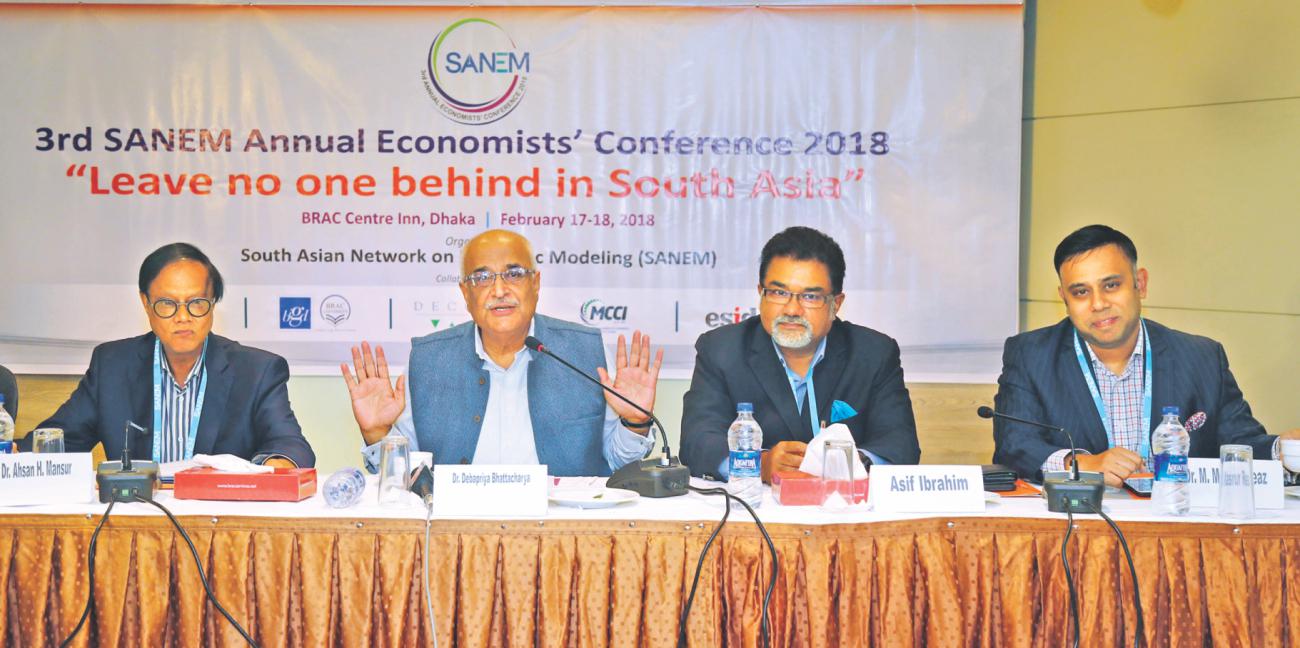Published in The Daily Star on Monday, 19 February 2018
Fix private sector’s problems to achieve SDGs: experts

Star Business Report
Bangladesh will not be able to achieve the Sustainable Develop-ment Goals within the 2030 deadline without addressing challenges confronting the private sector, experts said yesterday.
The country’s private sector is facing problems ranging from sluggish infrastructure investment, lack of skilled human resources to the energy crisis, unplanned urbanisation, and industrial pollution.
The 17 goals of the SDGs will not be achieved by 2030 if the government and the entrepreneurs do not take up the issues properly, according to the experts.
“There is no structure in the country to arrange a discussion between the policymakers and the businesses of the private sector on how to solve the existing challenges,” said Debapriya Bhattacharya, a distinguished fellow at the Centre for Policy Dialogue.
The authorities should give importance on resolving the issues in order to implement the SDGs, said Ahsan H Mansur, executive director of the Policy Research Institute of Bangladesh.
They spoke at a session titled “Reforms Need to Facilitate Private Sector Engagement for SDGs Achievement in Bangladesh” at the SANEM Annual Economists’ Conference 2018 at the Brac Centre Inn in Dhaka.
Bhattacharya said the required reforms in line with the SDGs are not being carried out as expected in absence of a discussion structure.
“Inclusive development is not possible without discussions. A structure should be developed by ensuring the participation of the private sector.”
The entrepreneurs should also come forward to implement the SDGs, he said.
Mansur said the SDGs are closely aligned with Bangladesh’s development goals.
The goals incorporate issues of environmental quality (climate change, pollution, and biodiversity loss and deforestation) and sustained economic resilience (improving access to sustainable energy resource, building sustainable cities and promotion of sustained economic growth), he said. The former economist of the International Monetary Fund said Bangladesh has largely neglected infrastructure investment. Bangladesh’s public investment in infrastructure is 2 percent of the gross domestic product, lagging behind the regional competitors.
In China and Vietnam, public sector infrastructure investment has exceeded 7 percent of GDP, Mansur said.
According to Mansur, a burning issue facing Bangladesh today is the growing shortage of natural gas as recent data suggest the current reserves are likely to be depleted in less than 10 years. He urged the industrial sector to increase gas use efficiency.
Mansur also said since most industries are located on the banks of the country’s main rivers, industrial pollution is a serious threat to water quality. Land grabbing by politically connected people also contributes to the unplanned development and waterlogging, he said.
M Masrur Reaz, a senior economist at the World Bank Group, said Bangladesh is capable of using only 35 percent of the global value chain because of inefficiency.
He said the country’s major export earning is coming from its traditional garment sector.
Bangladesh should produce diversified export-oriented items and discover new markets to benefit the most from the global value chain, he said.
Reaz recommended the policymakers focus on developing a skilled workforce and using the latest technologies to boost export earnings.
He said an increase in the flow of foreign direct investment is highly important to diversify exports.
“The capability of the local businesses can also be improved if foreign investors choose the country to make investment,” he said.
Asif Ibrahim, vice chairman of Newage Group of Industries, and Habibullah N Karim, managing director of Technohaven Company Ltd, also spoke.

